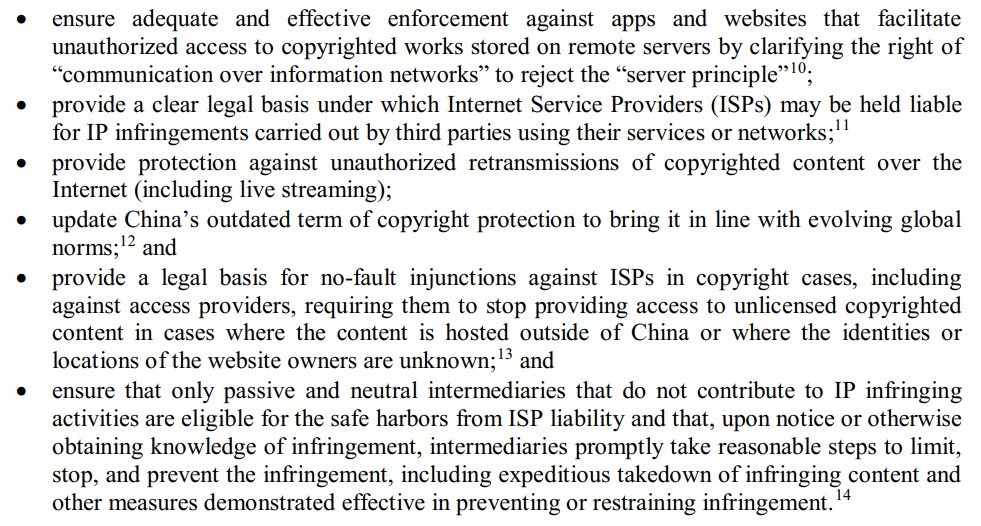The American copyright industry generates billions of dollars in annual revenue and is generally seen as one of the primary export products.
Whether it’s movies, music, software or other goods, US companies are among the market leaders.
This position has also made the US a leader when it comes to international copyright law and regulations. All around the world, laws have been tweaked and altered to accommodate the interests of major copyright holders.
These changes are usually the result of diplomatic pressure where major US companies get help from the US Government to protect their interests. For example, last year the USTR launched a review of South Africa’s copyright protection policies, with the threat of potential trade sanctions.
At the moment, the USTR is working on its annual review of China to see whether the country complies with its World Trade Organization (WTO) obligations. This triggered a response from various stakeholders, including several of the leading copyright groups.
One of the most detailed submissions comes from the International Intellectual Property Alliance (IIPA), which counts copyright groups including the MPA, RIAA, and ESA among its members. Their submission highlights that China has made some progress in recent years on various copyright issues, but more can be done.
Earlier this year China’s National People’s Congress released a draft bill to amend the country’s copyright law. This includes a wide variety of changes that are positive, IIPA notes, but there’s a detailed list of shortcomings too.
“While there are other positive aspects of the draft amendments—including enhanced remedies against infringement, increased damages, and the addition of punitive damages—the draft amendments do not address a number of deficiencies in China’s legal framework,” IIPA writes.
The key demands related to the copyright law amendments are summarized in the bulleted list below, which the IIPA handily provided.
For example, the US copyright groups would like China’s copyright law to support “no-fault” injunctions, so Chinese ISPs can be ordered to block pirate sites that are hosted overseas or operated by unknown persons.
This is an interesting demand, as these same “no-fault” injunctions don’t exist under US law. This is one of the main reasons why pirate sites are not blocked in the United States.
IIPA also suggests updating China’s law to extend the copyright term, which is currently the life of the author plus 50 years. According to the copyright holders, this should be extended by a minimum of 20 years.
Changes to China’s copyright law should further allow for stronger enforcement options to tackle pirate apps and websites, which remain a problem.
The submission calls out a long list of pirate sites and services, including 3dmgame.com, zimuzu.tv,25 btbtdy.net trix360.com, 92flac.com, sq688.com, 51ape.com dygod.net, ygdy8.com, gaoqing.la, mp4ba.com, btbtt.co, piahua.com, vodxc.com, lbdly.com, yymp3.com, musicool.cn, xh127.com, b9good.com, dygang.com, and many others.
The liability of online service providers is another topic IIPA would like China to address. Current law already covers secondary liability for ISPs, but IIPA suggests that the law should be clarified to “ensure more predictable liability decisions by Chinese judges.”
Some service providers are called out specifically by the copyright groups. They include Chinese technology giant Baidu, and specifically, its the cloud-storage service Baidu Pan.
According to IIPA, Baido Pan is regularly used by pirates and the notice and takedown system hasn’t been effective in deterring this problem. The Chinese Government should step up and convince the company to use rigorous filtering technology to deal with this.
“China’s government should encourage Baidu to do more, including improving implementation of its takedown tools, applying rigorous filtering technology to identify infringing content, and taking more effective action to suspend or terminate repeat infringers to ensure infringing content and links are removed expeditiously,” IIPA writes.
IIPA’s wishlist doesn’t come as a surprise. Also, since it’s merely a submission to the USTR, these demands may never reach the Chinese Government. And even if they do, China may not be very receptive.
Generally speaking, China is very cautious when it comes to outside influence within its borders. This is also reflected in IIPA’s own submission, which notes that foreign anti-piracy groups are prohibited from investigating piracy in China.
—
A copy of IIPA’s submission to the US Trade Representative, which overed a wide range of other IP-issues, is available here (pdf)


 The American copyright industry generates billions of dollars in annual revenue and is generally seen as one of the primary export products.
The American copyright industry generates billions of dollars in annual revenue and is generally seen as one of the primary export products.




